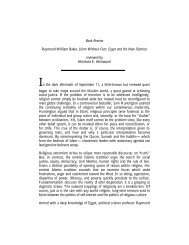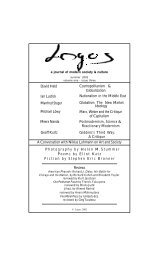Michael J. Thompson Stephen Eric Bronner Wadood Hamad - Logos
Michael J. Thompson Stephen Eric Bronner Wadood Hamad - Logos
Michael J. Thompson Stephen Eric Bronner Wadood Hamad - Logos
Create successful ePaper yourself
Turn your PDF publications into a flip-book with our unique Google optimized e-Paper software.
Stanley Aronowitz<br />
compared to turn of the 20th century populist and socialist pamphleteers<br />
whose aim was to simultaneously educate and arouse workers and farmers to<br />
the evils of corporate power.<br />
Yet in his most fertile period of intellectual work, the decade and a half ending<br />
with the publication of The Sociological Imagination (1959), with the possible<br />
exception of The Power Elite, Mills hardly expected to reach a popular, let<br />
alone mass public. Nevertheless, he always attempted to reach out to a wider<br />
public than did his fellow academics, even when he was formulating new<br />
theories, let alone engaging in public criticism. But Mills’s intention is entirely<br />
subversive of contemporary mainstream social science, especially the notion<br />
that intellectuals should remain neutral observers of economic, political and<br />
social life. While he performed his fair share of funded research—notably his<br />
study of Puerto Rico and the collective portraits of characteristic social types—<br />
most of his writing is addressed to potential and actual political publics.<br />
Following Marx and Weber, who at the end of his life was a major contributor<br />
in shaping the moral and legal framework of the Weimar Republic, Mills held<br />
that intellectuals and their ideas were embedded in the social antagonisms and<br />
struggles of their own time; they bring to their analysis a definite standpoint,<br />
whether or not they are prepared to acknowledge it.<br />
Yet Mills adhered to none of the mainstream parties nor to those on the<br />
fringes of mainstream politics. While he was a figure of his own time (his main<br />
work was done in the 1940s and 1950s, when issues of sex, gender and ecology<br />
were barely blips on the screen), his position was congenitally critical—of the<br />
right, conservatives, liberals, the relatively tiny parties of the left and especially<br />
members of his own shrinking group, the independent leftists. Like one of his<br />
heroes, the economist and social theorist Thorstein Veblen, himself a pariah in<br />
his chosen discipline, to paraphrase a famous aphorism of Marx, Mills was “in<br />
but not of” the academy insofar as he refuses the distinction between<br />
scholarship and partisanship. But, unlike Veblen, whose alienation from<br />
conventional economics was almost total, Mills was, for most of his<br />
professional career, a sociologist in his heart as much as his mind The rhetoric<br />
and the methods embodied in his books on American social structure—The<br />
New Men of Power, White Collar, and The Power Elite—are firmly rooted in<br />
the perspectives of mainstream American sociology at the end of the war.<br />
These perspectives owed as much to the methodological precepts of Emile<br />
<strong>Logos</strong> 2.3 – Summer 2003




